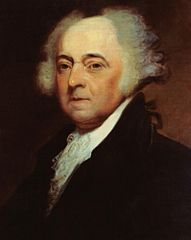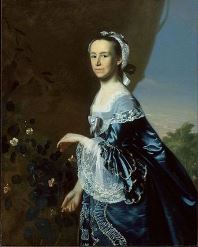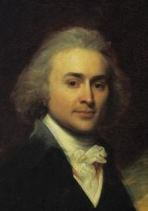Abigail Adams is the first of only two women in American history to be the wife of one President and the mother of another. Born in 1744 to a Congregationalist minister, her formal education was limited, but her self-education was extensive, and her wisdom and advice caused her to be a trusted adviser to significant Founding Fathers, especially her famous husband, John Adams. 1
Probably the most profound influence in guiding and shaping her life was her strong Christian faith. Her knowledge of the Scriptures was intimate, evidenced not only in her life but especially in her letters. Consider just a few from the year 1775 when she was personally witnessing the start of the American Revolution. For example, following the Battles of Lexington and Concord, she told her husband, John:

Nor doth the eye say unto the hand, “I have no need of thee” [1 Corinthians 12:21]. The Lord will not cast off His people, neither will He forsake his inheritance [Psalm 94:14]. Great events are most certainly in the womb of futurity, and if the present chastisements which we experience have a proper influence upon our conduct, the event will certainly be in our favor. . . . Pharaoh’s [i.e., King George III’s] heart is hardened, and he refuseth to hearken to them and will not let the people go [Exodus 8:32]. May their deliverance be wrought out for them, as it was for the children of Israel [Exodus 12]. 2
Several weeks later in describing the 1775 burning of Charlestown and Battle of Bunker Hill, she told him:
“The race is not to the swift, nor the battle to the strong; but the God of Israel is He that giveth strength and power unto His people. Trust in Him at all times, ye people, pour out your hearts before Him; God is a refuge for us” [Ecclesiastes 9:11 and Psalm 62:8]. Charlestown is laid in ashes. The battle began upon our entrenchments upon Bunker’s Hill, Saturday morning about three o’clock, and has not ceased yet, and it is now three o’clock Sabbath afternoon. 3
A week later, she wrote:
We live in continual expectation of hostilities. Scarcely a day that does not produce some; but like good Nehemiah, having made our prayer unto God and set the people with their swords, their spears, and their bows, we will say unto them “Be not ye afraid of them; remember the Lord, who is great and terrible, and fight for your brethren, your sons, and your daughters, your wives and your houses” [Nehemiah 4:14]. 4
She later told John:
And unto Him who mounts the whirlwind and directs the storm [Nahum 1:3] I will cheerfully leave the ordering of my lot; and whether adverse or prosperous days should be my future portion, I will trust in His right hand to lead me safely through [Psalm 139:10], and after a short rotation of events, fix me in a state immutable and happy. 5
By the end of 1775, a number of their friends had been killed in the conflict with Great Britain, and her own mother had also passed away. She told John:
How long, O Lord, shall the whole land say, I am sick! [Isaiah 33:24] Oh show us wherefore it is that Thou art thus contending with us [Job 10:2]. In a very particular manner I have occasion to make this inquiry, who have had breach upon breach – nor has one wound been permitted to be healed ere it is made to bleed afresh. In six weeks I count five of my near connections laid in the grave. . . . But the heavy stroke which most of all disturbs me is my dear mother. . . . He who deigned to weep over a departed friend [John 11:35] will surely forgive a sorrow which at all times desires to be bounded and restrained by a firm belief that a Being of infinite wisdom and unbounded goodness will carve out my portion in tender mercy to me. Yea, though He slay me, I will trust in Him, said holy Job [Job 13:15]. What though His corrective hand hath been stretched against me; I will not murmur. Though earthly comforts are taken away, I will not repine [1 Corinthians 10:10]. He who gave them has surely a right to limit their duration, and He has continued them to me much longer than I deserve. I might have been stripped of my children, as many others have been. I might – oh, forbid it Heaven – I might have been left a solitary widow! 6
By the close of the year, Abigail told John her personal conviction that:
[H]e who neglects his duty to his Maker may well be expected to be deficient and insincere in his duty towards the public. 7
 Around that time, she also wrote her close friend, Mercy Otis Warren, America’s first female historian who is called “The Conscience of the American Revolution,” and similarly told her:
Around that time, she also wrote her close friend, Mercy Otis Warren, America’s first female historian who is called “The Conscience of the American Revolution,” and similarly told her:
A patriot without religion in my estimation is as great a paradox as an honest man without the fear of God. 8
Her strong faith was just as apparent in her writings to her young son, John Quincy Adams. In 1778, John was dispatched to France and took with him their ten year old son. 9 After they arrived in Europe, Abigail told her young son:
It is almost four months since you left your native land and embarked upon the mighty waters, in quest of a foreign country. . . . [Y]ou have constantly been upon my heart and mind. . . . Great learning and superior abilities, should you ever possess them, will be of little value and small estimation, unless virtue, honor, truth, and integrity are added to them. Adhere to those religious sentiments and principles which were early instilled into your mind and remember that you are accountable to your Maker for all your words and actions. . . . I would much rather you should have found your grave in the ocean you have crossed, or that any untimely death crop you in your infant years, than see you an immoral, profligate, or graceless child. 10
In 1780 when her son John Quincy Adams was in Paris, she reminded him:
You have seen how inadequate the aid of man would have been if the winds and the seas had not been under the particular government of that Being Who “stretched out the heavens as a span” [Isaiah 40:12], Who “holdeth the ocean in the hollow of His hand” [Isaiah 40:12], and “rideth upon the wings of the wind” [Psalm 104:3]. . . . The only sure and permanent foundation of virtue is religion. Let this important truth be engraven upon your heart. And also that the foundation of religion is the belief of the only one God, and a just sense of His attributes as a Being infinitely wise, just, and good, to Whom you owe the highest reverence, gratitude, and adoration; Who superintends and governs all nature, even to clothing the lilies of the field [Matthew 6:28] and hearing the young ravens when they cry [Psalm 147:9]; but more particularly regards man, Whom he created after His own image [Genesis 1:26], and breathed into him an immortal spirit [Genesis 2:7], capable of a happiness beyond the grave. 11
What Abigail taught the young John Quincy Adams never departed him. In fact, when he was quite elderly, he reminisced of her impact upon him, recalling:
[In the] spring and summer of 1775, she taught me to repeat daily, after the Lord’s Prayer, before rising from bed, the Ode of Collins [a patriotic poem] on the patriot warriors who fell in the war. . . . Of the impression made upon my heart by the sentiments inculcated in these beautiful effusions of patriotism and poetry, you may form an estimate by the fact that now, seventy-one years after they were thus taught me, I repeat them from memory. 12
From his mother, this great Christian patriot early learned a love of God and a love of his country. But such was the Christian influence of Abigail Adams, a Godly heroine of the American Revolution.
WallBulders’ Collection includes an original Abigail letter which references her faith. For more about Abigail, get the book Wives of the Signers.
Endnotes
1 “John Adams and the Massachusetts Constitution,” Mass.gov, accessed May 8, 2025; Elizabeth Ellet, Women of the Revolution (New York; Baker and Scribner, 1849), II:31.
2 Abigail Adams to John Adams, May 7, 1775, Familiar Letters of John Adams and His Wife Abigail Adams, During the Revolution, ed. Charles Francis Adams (Boston: Houghton, Mifflin and Company, 1875), 54.
3 Abigail to John Adams, June 18, 1775, Letters of Mrs. Adams, the Wife of John Adams. With an Introductory Memoir by Her Grandson Charles Francis Adams (Boston: Charles C. Little and James Brown, 1840), I:40.
4 Abigail to John Adams, June 25, 1775, Letters of Mrs. Adams (1840), I:45.
5 Abigail Adams to John Adams, September 16, 1775, Familiar Letters, ed. Adams (1875), 98.
6 Abigail to John Adams, October 9, 1775, Familiar Letters, ed. Adams (1875), 106.
7 Abigail to John Adams on November 5, 1775, Familiar Letters, ed. Adams (1875), 122.
8 Abigail Adams to Mercy Warren in November, 1775, Warren-Adams Letters: Being Chiefly a Correspondence Among John Adams, Samuel Adams, and John Warren (The Massachusetts Historical Society, 1917), I:180.
9 William H. Seward, The Life and Public Services of John Quincy Adams, Sixth President of the United States, with the Eulogy Delivered Before the Legislature of New York (Auburn: Derby, Miller and Company, 1849), 30-32.
10 Abigail Adams to John Quincy Adams, June 1778, Letters of Mrs. Adams (1840), I:122-125.
11 Abigail to John Quincy Adams, March 20, 1780, Letters of Mrs. Adams (1840), I:146- 147.
12 John Quincy Adams to Mr. Sturge in 1846, Memoirs of John Quincy Adams, ed. Charles Francis Adams (Philadelphia: J. B. Lippincott and Company, 1874), 1:5-6.
Still looking for answers? Visit our FAQ page
More Resources
Know the Truth and Protect Your Freedoms.
Still looking for answers? Visit our FAQ page
Stay Informed with the Latest Resources
Enter your email address to receive our regular newsletter, with important information and updates right in your inbox!

 You have seen how inadequate the aid of man would have been if the winds and the seas had not been under the particular government of that Being Who “stretched out the heavens as a span” [Isaiah 40:12], Who “holdeth the ocean in the hollow of His hand” [Isaiah 40:12], and “rideth upon the wings of the wind” [Psalm 104:3]. . . . The only sure and permanent foundation of virtue is religion. Let this important truth be engraven upon your heart. And also that the foundation of religion is the belief of the only one God, and a just sense of His attributes as a Being infinitely wise, just, and good, to Whom you owe the highest reverence, gratitude, and adoration; Who superintends and governs all nature, even to clothing the lilies of the field [Matthew 6:28] and hearing the young ravens when they cry [Psalm 147:9]; but more particularly regards man, Whom he created after His own image [Genesis 1:26], and breathed into him an immortal spirit [Genesis 2:7], capable of a happiness beyond the grave.
You have seen how inadequate the aid of man would have been if the winds and the seas had not been under the particular government of that Being Who “stretched out the heavens as a span” [Isaiah 40:12], Who “holdeth the ocean in the hollow of His hand” [Isaiah 40:12], and “rideth upon the wings of the wind” [Psalm 104:3]. . . . The only sure and permanent foundation of virtue is religion. Let this important truth be engraven upon your heart. And also that the foundation of religion is the belief of the only one God, and a just sense of His attributes as a Being infinitely wise, just, and good, to Whom you owe the highest reverence, gratitude, and adoration; Who superintends and governs all nature, even to clothing the lilies of the field [Matthew 6:28] and hearing the young ravens when they cry [Psalm 147:9]; but more particularly regards man, Whom he created after His own image [Genesis 1:26], and breathed into him an immortal spirit [Genesis 2:7], capable of a happiness beyond the grave. 








